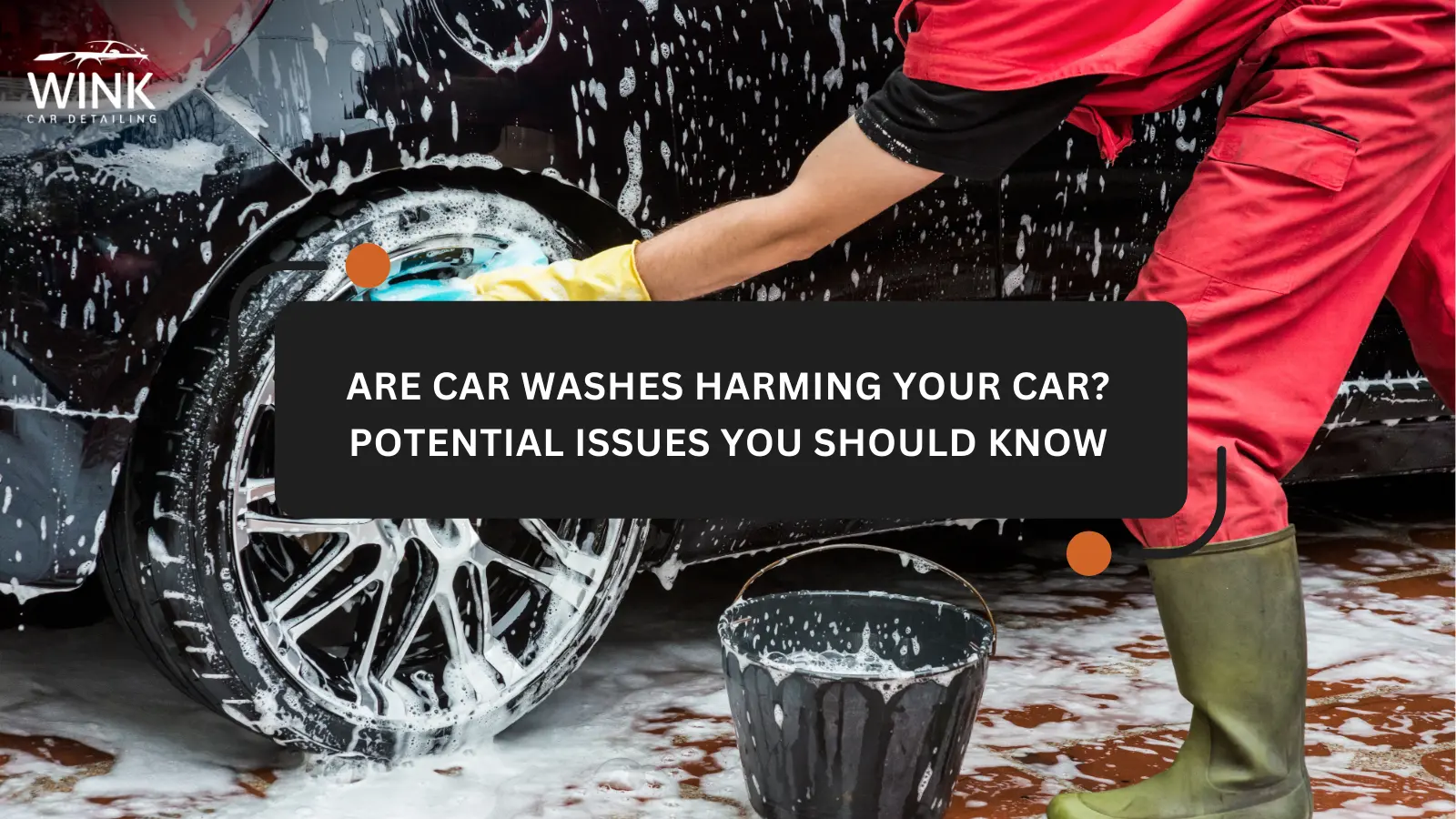Are Car Washes Harming Your Car? Potential Issues You Should Know
Although car wash technology is always improving, many car owners continue to ask themselves, "Are car washes bad for my car?" This is an important question, especially if you're careful about keeping your car shiny and clean. It seems sense to desire the best for your car and to keep it free from harm that can detract from its visual appeal.
Typical Car Wash Issues: Things to Look Out for
Although car washes might save time, there may be drawbacks to using them. This is an in-depth look at some typical issues that arise during car washes and how to prevent them.
- Swirl marks and scratches
The question of whether car washes might harm your car's paint is among the most often asked ones. Regretfully, the truth is that the surface of your car may occasionally have swirl and scratch marks from automatic car washes. If you use soft microfiber towels to gently wipe off your paint and glass, it may be less harsh than using high speed spinning brushes to remove grime.
Older car washes with neglected or infrequently cleaned brushes are more prone to have these problems. The bristles may become clogged with grit and dirt from old cars, which might harm your paint. If the cloth or foam in soft cloth car washes isn't maintained immaculately clean, there's the same risk.
- Fading and Dulling Paint
Paint fading is another problem that can arise from frequent use of an automated car wash. The protective layers of wax and sealant can be worn down or removed over time by strong chemicals and abrasive cleaning equipment, resulting in a faded and dull look. Visit a respectable hand car wash where detailers utilize high quality materials to reduce this danger. Wax treatments can be used on a regular basis to assist prevent paint fading.
- High water pressure damage
Although they are often utilized in car washes, high pressure water jets can occasionally be damaging. If your car is older or has paint problems already, this is more likely to happen. For example, the pressure from the water might exacerbate a paint chip that already exists.
Additionally vulnerable are older cars with deteriorated window, door, and sunroof seals. These seals may be compromised by high pressure water, which might result in leaks. It's a good idea to inspect your car's paintwork and seals before employing the high-pressure jets if you're using a brushless or laser car wash.
- Dangerous Chemicals and Debris
The use of harsh chemicals is one of the drawbacks of some car wash services. Strong cleansers with an acidic basis that dissolve oil and grime can be harsh on delicate surfaces and wax coatings. These chemicals might leave a residue that dulls the paint finish on your car if they aren't thoroughly washed off.
Enquire about the products the car wash uses when selecting one, especially if it is waterless. To reduce the chance of harm, choose mild or organic car wash products when doing the washing yourself.
- Interior Moisture and Mold
After a full service car wash, your car's interior may not be completely dried, which might result in a moist environment conducive to the growth of mildew. This is particularly frequent when carpets, floor mats, and furniture are shampooed with excessive water. It can be mildew if you smell musty after washing your car.
Select car washes that make use of effective drying processes to steer clear of this issue. As an alternative, think about using steam for car interior detailing, which may thoroughly clean your interior without wetting it.
- Watermarks
Another problem that might occur after a car wash is water marks. These stains appear on your car's surface as water droplets dry, usually as a result of air drying naturally. When hard water evaporates, it can leave significant markings on your paintwork since it includes minerals like calcium and magnesium.
Make careful to completely rinse off any soap and give the area a last rinse with deionized water to avoid water stains. Another way to prevent spotting is to have a microfiber towel on hand to dab away any surplus moisture.
- Scratches on Tires and Wheels
If your car isn't positioned correctly or the car wash tracks aren't aligned correctly, scratches and scrapes may appear on your wheels and tires. Furthermore, many car washes include harsh chemicals that can erode tyre rubber and destroy wheel finishes, particularly when acid based cleaners are utilized.
Wheel and tire damage can be minimized by using a touch less car wash that uses high pressure water and detergents rather than brushes.
- Issues with the Trim and Seals
The rubber trim and seals surrounding your car's windows, doors, and sunroofs can get scratched by older car washes with abrasive brushes. Water can also be forced into these seals by high pressure water jets, which could result in leaks.
You have more control and less chance of harming seals and trim when you wash your car by hand with the proper supplies and equipment. Pick automatic car washes if you like; stay away from locations with obviously unclean or worn brushes and go for ones with clean equipment.
- Marks on the Mirrors and Windscreens
Windscreens and mirrors can sustain scratches or other damage during a car wash, however this is less frequent. Glass surfaces can be scratched by dirt and sand particles trapped in rotating brushes or cloths. Your side mirrors may sustain further damage from washing if they are loose or cracked.
Cleaning your hands is a safer way to keep your mirrors and windscreen clean. It reduces the possibility of injury by giving you control over the equipment and supplies you utilize.
- Poor Rinsing and Cleaning
When selecting a car wash, it's important to pay attention to details. Inadequate washing and rinsing might be the consequence of poorly maintained machinery or poor cleaning methods, which can lead to issues in the long run. As a case study:
- Rust and corrosion can result from neglecting to clean the underside of your car of dirt and road salt.
- Odors and the growth of mildew might arise from inadequate interior cleaning.
- If left untreated, bird droppings, bug spatter, and tree sap can cause damage to your paint and may not be adequately removed by express washes.
- Inadequate washing can leave chemical and soap residues on your car, which can cause streaks or harm to the clear finish.
- Damaged Antennas
Antenna breaks are a frequent problem at car washes. Automated car washes use brushes or fabric strips that can strike antennas with enough force to cause them to bend, shatter, or come loose. If antennas are not installed securely, high-pressure water can potentially cause stress on them.
Retract or unscrew your antenna before entering the car wash to prevent this issue. Pay heed to any antenna related advice provided by the car wash; failing to do so may result in costly repairs.
Choosing the Right Car Wash
Car washes are convenient, but there may be dangers involved. The age of your car, the reputation of the car wash, and the equipment's state are some of the variables that determine how serious these risks are. Touch less car washes may utilize stronger chemicals that over time might remove your paint finish, but automatic car washes that employ brushes or cloths may retain dirt and harm your paint.
Making an informed choice about your car wash can help reduce these dangers. Seek out car washes with a clean reputation and clean machinery. If possible damage worries you, think considering taking your car to a trustworthy hand wash that employs delicate cleaning methods. For instance, Wink Car Detailing provides an amazing car wash experience with thorough attention to detail and steam cleaning equipment that is kind to your car. You can trust us with your car.





